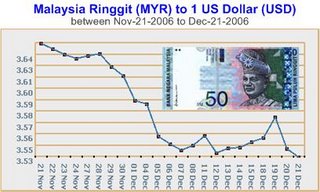The Malaysian ringgit hit its highest level against the dollar in nearly nine years today, Friday 22-Dec-2006, helped by this week’s turmoil in Thai markets that has led some investors to switch funds to other Asian countries, according to dealers in Singapore.
According to Reuters data, the ringgit (MYR) rose as far as 3.5280 per dollar, a level last seen around March 1998. Malaysia ended the ringgit’s peg to the U.S. currency in July 2005 under current Badawi administration who took over from Mahathir.
 Despite rising in recent weeks, second Finance Minister Nor Mohamed Yakcop maintained that the authorities were not worried it was too strong against the dollar. I hope this minister knows and serious about what he said because according to dealers the currency was likely to head higher towards 3.5 per dollar in coming weeks.
Despite rising in recent weeks, second Finance Minister Nor Mohamed Yakcop maintained that the authorities were not worried it was too strong against the dollar. I hope this minister knows and serious about what he said because according to dealers the currency was likely to head higher towards 3.5 per dollar in coming weeks.
But what if the ringgit keeps on getting higher and breach below 3.5 per dollar? What will the authorities do or what are the measures to combat such a trend? I doubt the Finance Minister is stupid enough to re-introduce currency control which Malaysia implemented during 1997 Asia Currency Crisis and cloned last week by Thailand authorities. But besides this measure, what other measure(s) does a country has?
Bank Negara Malaysia can help by weakening the ringgit, not that Bank Negara has not done this before, but to what extend and risk exposure should the country’s reserve be used to stabilize ringgit? What if the speculators are indeed planning another round of attack? Are the relevant authorities ready to take on the challenge this round? We shall wait and see. Furthermore we’re looking into New Year with a last digit of “7” which didn’t bring prosperity if history were to use as yardstick – remember what happen during 1987 Global Financial Crisis and 1997 Asia Currency Crisis? What do you think 2007 will bring us?
In the meantime, the extra foreign cash from Thailand seems to benefit ringgit currency instead of stock market. Logically foreign funds would rather park these cash in currency than stocks because currency is more liquid – any silly mistakes again and the first thing investors will do is to press “ENTER” to sell ringgit immediately.
# TIP: Short US dollar against MYR for short-term gain.
Other Articles That May Interest You …

|
|
December 22nd, 2006 by financetwitter
|


|

|

|

|

|

|




























Comments
Add your comment now.
Leave a Reply